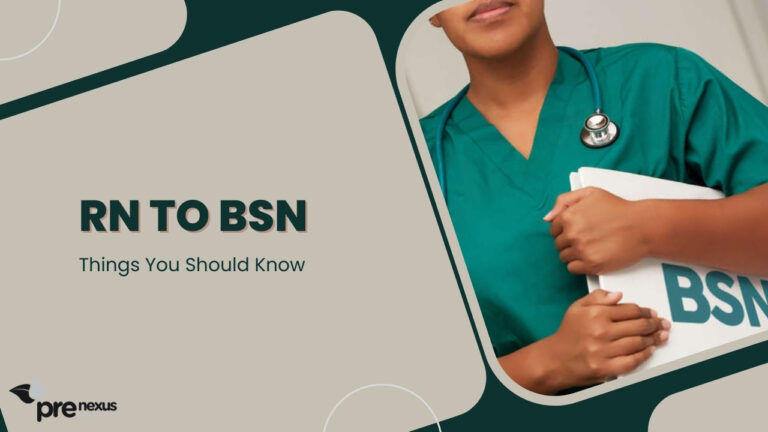In the ever-evolving landscape of nursing education, the journey from Registered Nurse (RN) and Family Nurse Practitioner (FNP) to Bachelor of Science in Nursing (BSN) has been a path many have sought to tread.
This transition not only marks a significant leap in a nurse’s professional development but also opens doors to advanced career opportunities, higher salaries, and a broader understanding of patient care.
As of 2024, the quest for the easiest RN-to-BSN program has become a hot topic among nursing professionals looking to advance their education with minimal hurdles. Today, I will walk you through everything you should know about these programs, making your journey from RN to BSN as seamless as possible.
1. Knowing RN-to-BSN Online Programs
Before we delve into the specifics, it’s crucial to understand what RN-to-BSN online programs entail.
Designed for practicing registered nurses who already hold an associate degree in nursing (ADN) or a nursing diploma, these programs offer a pathway to earn a bachelor’s degree through a combination of general education and advanced nursing coursework.
The flexibility and accessibility of online formats have made these programs particularly attractive to working professionals.
For those exploring accelerated paths to advance their nursing careers, Holy Family University offers an online Accelerated BSN program designed for individuals holding a bachelor’s degree in any field, aiming to transition into nursing.
This program promises a comprehensive curriculum, blending online coursework with hands-on clinical experiences, aimed at preparing graduates for the NCLEX-RN exam in just 14 months. For more details, visit onlinenursing.holyfamily.edu.
2. Admission Requirements and Criteria
What Are the General Admission Requirements?
The admission requirements for the easiest RN-to-BSN programs are designed to be inclusive, recognizing the diverse backgrounds of practicing nurses. Typically, these include:
- Holding an active RN license.
- Possessing an associate degree in nursing or a nursing diploma from an accredited institution.
- A minimum GPA is often set at 2.0 or higher, though this can vary by program.
Interestingly, many of these programs do not require pre-admission testing or the retaking of prerequisite courses if you have already completed them, streamlining the transition for many applicants.
3. Duration and Flexibility
How Long Will It Take?
The duration of RN-to-BSN online programs can vary, but most are designed to be completed within one to two years, accommodating the busy schedules of working nurses. Programs like the University of Texas at El Paso boast completion times as short as 2.5 semesters, offering one of the fastest paths to a BSN.
Can I Work While Studying?
Yes, and this is a significant advantage of online programs. Many are structured to offer flexibility, allowing nurses to continue working while advancing their education. This flexibility is crucial for those who cannot afford to take time off or prefer to apply new knowledge and skills in real-time.
4. Cost Considerations
When it comes to funding your education, the cost of RN-to-BSN programs can vary widely by institution. However, online programs are often more affordable than their on-campus counterparts.
This affordability, combined with the potential for financial aid, scholarships, and employer tuition reimbursement programs, makes advancing your nursing education more accessible than ever.
5. Coursework and Curriculum
Typical coursework in RN-to-BSN programs encompasses a blend of general education and advanced nursing courses, along with electives that allow for specialization. This curriculum is designed to broaden your knowledge base, enhance your clinical judgment, and prepare you for leadership roles in nursing.
Some programs, like Cox College, even allow students to take master’s level courses as part of their undergraduate degree, offering a head start on graduate education.
6. Selecting the Right Program for You
What Should I Look For?
When choosing an RN-to-BSN program, consider factors such as accreditation, the flexibility of the schedule, the types of support services available to online students, and the program’s reputation within the nursing community.
Institutions like Cox College, Delta State University, and the University of Maine-Fort Kent are known for their accessible and reputable programs.
How Do I Know If a Program Is Accredited?
Accreditation is a key factor in selecting a program, as it ensures the education you receive meets high standards of quality and is recognized by employers and other educational institutions.
Look for programs accredited by the Commission on Collegiate Nursing Education (CCNE) or the Accreditation Commission for Education in Nursing (ACEN).
7. Making Your Decision
Choosing the easiest RN-to-BSN program doesn’t mean compromising on quality. It means finding a program that aligns with your personal and professional needs, offering a balance between accessibility, affordability, and academic rigor.
With the right program, you can advance your nursing career, enhance your skills, and contribute to the evolving field of healthcare with confidence.
Evaluating Program Success Rates
One critical aspect often overlooked is the success rate of a program’s graduates. This includes licensure exam pass rates, employment rates post-graduation, and student satisfaction surveys.
High success rates can be a testament to the quality of education and support provided by the program. Schools may publish this data on their websites, or you can inquire directly to get a sense of how well they prepare students for the next steps in their careers.
The Support Services Offered
The level of support offered to online students is paramount, especially in programs where you might never set foot on campus. Look for programs that offer comprehensive services, including academic advising, tutoring, career services, and technical support.
These resources can make a significant difference in your educational experience, helping you to overcome any challenges you encounter along the way.
Exploring Clinical Placement Assistance
For many RN-to-BSN students, finding opportunities to fulfill clinical requirements can be a challenge, particularly for those in remote areas or with limited local healthcare facilities.
Some programs offer clinical placement services, helping students to secure placements that meet their program’s requirements. This support can alleviate one of the major logistical hurdles of completing your BSN.
FAQs
Do I Need Clinical Experience to Enroll in An RN-to-BSN Program?
No, most RN-to-BSN programs require you to have an RN license, which you would have obtained after gaining clinical experience through your initial nursing program.
Can I Transfer Credits from Another BSN Program?
Yes, many programs allow you to transfer credits, but it depends on the institution’s policies and the accreditation of the courses you’ve completed.
Are There Any In-Person Requirements for Online RN-to-BSN Programs?
Most programs are fully online, but some may have occasional in-person requirements, such as orientations or labs, depending on the school.
How Do Online Classes Accommodate Different Time Zones?
Online programs often use asynchronous learning, allowing students to complete coursework at their convenience and accommodating different time zones.
Is Financial Aid Available for Part-Time Students in These Programs?
Yes, financial aid is often available for part-time students, but eligibility may vary based on the number of credits taken per semester.
Can I Specialize in A Particular Area of Nursing Through an RN-to-BSN Program?
While RN-to-BSN programs primarily focus on general nursing education, some offer electives or courses that can introduce you to specialized areas of nursing.
Final Words
The journey from RN to BSN in 2024 is more accessible than ever, thanks to the variety of online programs designed to fit the lives of working nurses.
By considering the factors outlined above, you can select a program that not only meets your immediate educational needs but also sets you up for long-term success in the nursing profession.
I am a retired internal medicine physician named Dr. William Tousignant. With over three decades of experience in the field of geriatric care, I specialized in diagnosing and managing health issues among senior patients throughout my career.









